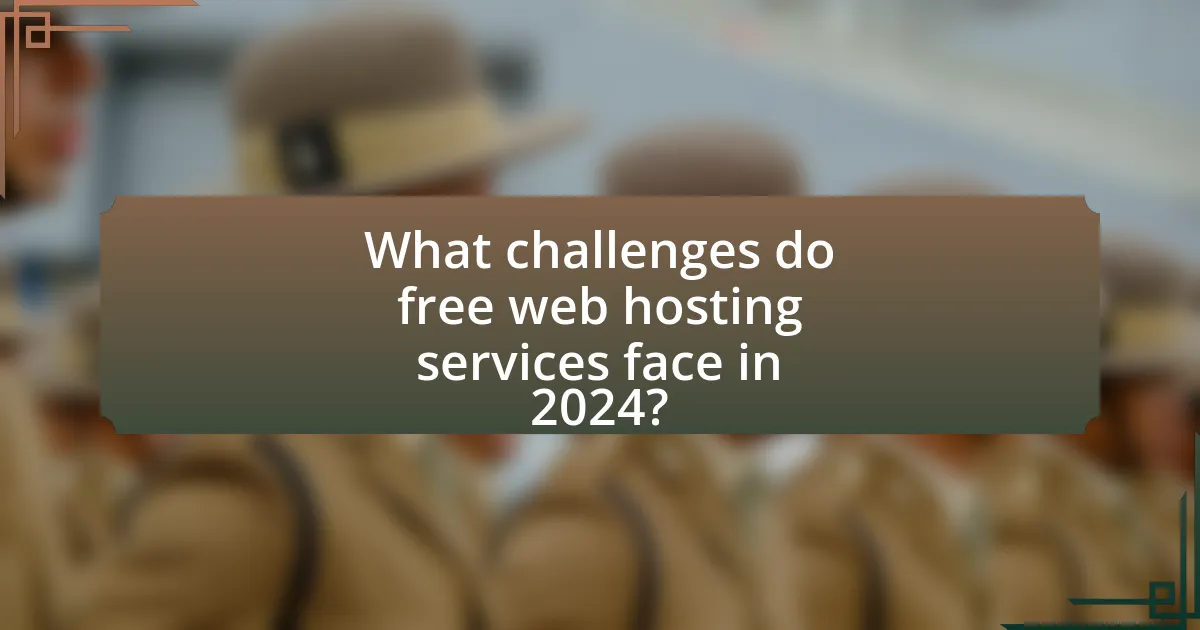The article focuses on the future of free web hosting, highlighting emerging trends for 2024, including the integration of artificial intelligence, enhanced security features, and the rise of decentralized hosting solutions. It discusses the evolving landscape of free web hosting, characterized by a shift towards freemium models and the influence of technological advancements such as cloud computing and automation. User expectations are also examined, emphasizing demands for higher performance, security, and improved customer support. Additionally, the article addresses challenges faced by free web hosting services, including competition and security concerns, while outlining innovations expected to shape the industry in the coming years.

What are the emerging trends in free web hosting for 2024?
Emerging trends in free web hosting for 2024 include increased integration of artificial intelligence, enhanced security features, and the rise of decentralized hosting solutions. AI tools are being utilized to automate website management and optimize performance, making it easier for users to maintain their sites without technical expertise. Additionally, as cyber threats grow, free hosting services are prioritizing security measures such as SSL certificates and DDoS protection to safeguard user data. Furthermore, decentralized hosting platforms are gaining traction, allowing users to host websites on a distributed network, which enhances reliability and reduces dependency on traditional servers. These trends reflect the evolving landscape of web hosting, driven by user demands for efficiency, security, and innovation.
How is the landscape of free web hosting changing?
The landscape of free web hosting is evolving towards increased monetization and enhanced features. Providers are shifting from purely free services to freemium models, where basic hosting remains free but advanced features require payment. This change is driven by the need for sustainability and improved service quality, as evidenced by platforms like WordPress.com and Wix, which offer free tiers but monetize through premium upgrades. Additionally, the rise of cloud-based solutions is enabling more robust free hosting options, allowing users to access scalable resources without upfront costs.
What technological advancements are influencing free web hosting?
Technological advancements influencing free web hosting include cloud computing, containerization, and artificial intelligence. Cloud computing enables scalable resources and cost-effective storage solutions, allowing providers to offer free hosting services with minimal overhead. Containerization, through technologies like Docker, facilitates efficient resource management and deployment, enhancing the performance of free hosting platforms. Artificial intelligence optimizes user experience by automating customer support and personalizing services, making free web hosting more accessible and user-friendly. These advancements collectively enhance the reliability and functionality of free web hosting services, catering to a growing user base.
How are user expectations evolving in the free web hosting market?
User expectations in the free web hosting market are evolving towards higher performance, enhanced security, and improved customer support. As users increasingly rely on online presence for personal and business purposes, they demand faster loading times, reliable uptime, and robust security features to protect their data. According to a 2023 survey by HostingAdvice, 78% of users indicated that speed and reliability are their top priorities when selecting a free web hosting service. Additionally, users are seeking more intuitive interfaces and better customer support, with 65% expressing dissatisfaction with the current level of assistance provided by free hosting platforms. This shift reflects a growing awareness of the importance of quality in free services, pushing providers to enhance their offerings to meet these rising expectations.
What role do social media and community engagement play in free web hosting?
Social media and community engagement are crucial for the success of free web hosting services. They facilitate user interaction, foster brand loyalty, and provide platforms for feedback and support. For instance, companies like WordPress and Wix leverage social media to create vibrant communities where users share experiences, troubleshoot issues, and exchange ideas, enhancing user satisfaction and retention. Additionally, community-driven forums and social media groups often serve as valuable resources for new users, helping them navigate the complexities of web hosting. This engagement not only promotes the hosting service but also builds a sense of belonging among users, which is essential for long-term growth in the competitive landscape of free web hosting.
How can free web hosting providers leverage social media for growth?
Free web hosting providers can leverage social media for growth by creating engaging content that showcases their services and user success stories. By utilizing platforms like Facebook, Twitter, and Instagram, these providers can reach a broader audience, as social media has over 4.5 billion active users globally, allowing for targeted advertising and community engagement. Additionally, they can encourage user-generated content and testimonials, which can enhance credibility and attract new users. Research indicates that 79% of consumers say user-generated content highly impacts their purchasing decisions, making it a powerful tool for growth.
What community-driven features are becoming popular in free web hosting?
Community-driven features gaining popularity in free web hosting include user forums, collaborative project spaces, and integrated feedback systems. User forums facilitate knowledge sharing and support among users, enhancing community engagement. Collaborative project spaces allow users to work together on web development projects, fostering a sense of teamwork and shared learning. Integrated feedback systems enable users to provide input on platform features and improvements, ensuring that the hosting services evolve according to community needs. These features reflect a growing trend towards user-centric development in the free web hosting sector, as evidenced by platforms like GitHub Pages and WordPress.com, which prioritize community interaction and feedback.

What challenges do free web hosting services face in 2024?
Free web hosting services face significant challenges in 2024, primarily due to increased competition and evolving user expectations. As more providers enter the market, differentiation becomes difficult, leading to a race to offer better features without increasing costs. Additionally, users now demand higher performance, security, and customer support, which free services often struggle to provide due to limited resources. According to a 2023 survey by HostingAdvice, 70% of users reported dissatisfaction with the reliability of free hosting services, highlighting the struggle to maintain uptime and service quality. Furthermore, the rise of ad-blocking technologies limits revenue generation for free hosts, making it challenging to sustain operations while offering no-cost services.
How do security concerns impact free web hosting?
Security concerns significantly impact free web hosting by limiting the features and reliability of the services offered. Free web hosting providers often lack robust security measures, making websites vulnerable to hacking, data breaches, and malware attacks. According to a 2021 report by Cybersecurity Ventures, 60% of small businesses that experience a cyber attack go out of business within six months, highlighting the critical nature of security for online presence. Additionally, free hosting services may not provide adequate customer support or regular updates, further exacerbating security risks. As a result, users may face increased downtime, loss of data, and compromised user information, ultimately affecting their credibility and trustworthiness online.
What measures can be taken to enhance security in free web hosting?
To enhance security in free web hosting, users should implement strong password policies, utilize SSL certificates, and regularly update software. Strong passwords reduce the risk of unauthorized access, while SSL certificates encrypt data transmitted between the user and the server, protecting sensitive information. Regular software updates patch vulnerabilities, minimizing the risk of exploitation. According to a 2021 report by Cybersecurity Ventures, 60% of small businesses that experience a cyber attack go out of business within six months, highlighting the importance of these security measures.
How do data privacy regulations affect free web hosting providers?
Data privacy regulations significantly impact free web hosting providers by imposing strict compliance requirements that can limit their operational flexibility. For instance, regulations like the General Data Protection Regulation (GDPR) in Europe mandate that providers ensure user data protection, which often necessitates implementing costly security measures and data management practices. These regulations can lead to increased operational costs for free web hosting providers, as they may need to invest in legal counsel, data protection officers, and technology to comply with data handling and user consent requirements. Consequently, some free web hosting services may reduce their offerings or shift to paid models to cover compliance costs, ultimately affecting their business sustainability and user accessibility.
What are the limitations of free web hosting services?
Free web hosting services have several limitations, including restricted storage space, limited bandwidth, and lack of customer support. These services often impose tight quotas on disk space and data transfer, which can hinder website performance and scalability. Additionally, free hosting typically includes advertisements on users’ sites, reducing professionalism and user experience. Security features are often minimal, leaving websites vulnerable to attacks. Furthermore, users may face restrictions on custom domain names, limiting branding opportunities. According to a 2021 survey by HostingAdvice, 70% of users reported dissatisfaction with the performance and reliability of free hosting options, highlighting these significant drawbacks.
How do resource constraints affect performance in free web hosting?
Resource constraints significantly hinder performance in free web hosting by limiting available bandwidth, storage, and processing power. These limitations often result in slower website loading times, increased downtime, and reduced ability to handle traffic spikes. For instance, many free hosting services impose strict data transfer limits, which can lead to throttling or service interruptions when exceeded. Additionally, the lack of dedicated resources means that multiple users share the same server, causing performance degradation during peak usage times. Studies have shown that websites hosted on constrained resources can experience load times exceeding three seconds, negatively impacting user experience and search engine rankings.
What are the common restrictions users face with free web hosting?
Users of free web hosting commonly face restrictions such as limited storage space, bandwidth caps, and lack of customer support. These limitations often hinder website performance and scalability, as many free hosting services provide only a few hundred megabytes of storage and restrict data transfer to a certain amount per month. Additionally, users may encounter mandatory advertisements on their sites, which can detract from the user experience and brand image. Security features are often minimal or non-existent, leaving websites vulnerable to attacks. Furthermore, free hosting typically does not allow for custom domain names, forcing users to operate under subdomains that can affect credibility. These restrictions are prevalent across various free hosting platforms, making it challenging for users to establish a professional online presence.

What innovations are expected in free web hosting by 2024?
By 2024, innovations in free web hosting are expected to include enhanced performance through the use of artificial intelligence for resource allocation, improved security features such as automated threat detection, and the integration of serverless architecture to streamline hosting processes. These advancements aim to provide users with faster loading times, greater reliability, and a more user-friendly experience. For instance, AI-driven systems can optimize server loads in real-time, significantly improving site performance, while automated security measures can proactively identify and mitigate potential vulnerabilities, addressing the growing concerns around cybersecurity in web hosting.
How are AI and automation shaping the future of free web hosting?
AI and automation are significantly enhancing the future of free web hosting by streamlining resource management and improving user experience. These technologies enable automated provisioning of server resources, allowing users to quickly set up and manage their websites without extensive technical knowledge. For instance, AI-driven algorithms can optimize server performance and allocate bandwidth dynamically based on real-time traffic, ensuring efficient use of resources. Additionally, automation tools facilitate routine maintenance tasks, such as backups and updates, reducing downtime and enhancing reliability. According to a report by Gartner, by 2024, 75% of organizations will leverage AI for operational efficiency, which will likely extend to free web hosting services, making them more robust and user-friendly.
What specific AI tools are being integrated into free web hosting services?
Specific AI tools being integrated into free web hosting services include website builders powered by artificial intelligence, chatbots for customer support, and automated content generation tools. These tools enhance user experience by simplifying website creation, providing instant assistance, and generating relevant content efficiently. For instance, platforms like Wix and WordPress are incorporating AI-driven features that allow users to design websites through natural language prompts, demonstrating the growing trend of AI integration in web hosting services.
How can automation improve user experience in free web hosting?
Automation can significantly enhance user experience in free web hosting by streamlining processes and reducing manual intervention. By automating tasks such as account setup, resource allocation, and customer support, users can enjoy quicker access to services and immediate resolutions to common issues. For instance, automated onboarding processes can guide new users through setup without requiring extensive technical knowledge, leading to higher satisfaction rates. Additionally, automated monitoring tools can proactively identify and resolve performance issues, ensuring that users experience minimal downtime. According to a study by the International Journal of Information Management, organizations that implement automation in service delivery report a 30% increase in user satisfaction due to faster response times and improved service reliability.
What new features are users looking for in free web hosting?
Users are looking for enhanced storage options, improved bandwidth, and better security features in free web hosting. Specifically, many users desire at least 1 GB of storage and unlimited bandwidth to support growing website needs. Additionally, features like SSL certificates for secure connections and automated backups are increasingly requested to ensure data safety. A survey by HostingAdvice in 2023 indicated that 70% of users prioritize security features, while 65% seek more storage and bandwidth options, highlighting these as critical factors in their decision-making process.
How important is scalability for users of free web hosting services?
Scalability is crucial for users of free web hosting services because it directly impacts their ability to grow and manage increased traffic and resource demands. Users often start with limited resources, but as their websites gain popularity, the need for scalable solutions becomes evident. According to a survey by HostingAdvice, 70% of small businesses reported that scalability was a key factor in their choice of hosting provider, indicating that the ability to upgrade resources without significant downtime or cost is essential for maintaining website performance and user experience.
What role does customer support play in the success of free web hosting?
Customer support is crucial for the success of free web hosting as it directly influences user satisfaction and retention. Effective customer support helps users navigate technical issues, enhances their overall experience, and builds trust in the service. According to a survey by Zendesk, 82% of consumers have stopped doing business with a company due to poor customer service, highlighting the importance of responsive support in maintaining user engagement. In the competitive landscape of free web hosting, where users have numerous alternatives, strong customer support can differentiate a service and foster loyalty, ultimately contributing to its long-term success.
What best practices should users follow when choosing free web hosting?
Users should prioritize reliability, features, and support when choosing free web hosting. Reliable hosting ensures minimal downtime, which is crucial for maintaining website accessibility; for instance, platforms like InfinityFree and 000webhost have established reputations for uptime. Users should also evaluate the features offered, such as storage space, bandwidth, and the ability to use custom domains, as these can significantly impact website performance. Additionally, assessing the availability of customer support is essential, as responsive support can help resolve issues quickly. According to a 2023 survey by HostingAdvice, 70% of users reported that responsive customer support was a key factor in their satisfaction with hosting services.
How can users evaluate the reliability of free web hosting providers?
Users can evaluate the reliability of free web hosting providers by examining uptime guarantees, user reviews, and the provider’s support options. Uptime guarantees indicate the expected availability of the service, with reputable providers typically offering at least 99.9% uptime. User reviews on platforms like Trustpilot or Reddit provide insights into real experiences, highlighting issues such as downtime or customer service responsiveness. Additionally, assessing the availability of support channels, such as live chat or email, can indicate how well the provider addresses user concerns. These factors collectively help users determine the reliability of a free web hosting provider.
What tips can help users maximize their experience with free web hosting?
To maximize their experience with free web hosting, users should choose a provider that offers reliable uptime and sufficient bandwidth. Reliable uptime ensures that websites remain accessible, while adequate bandwidth prevents slow loading times, which can deter visitors. Users should also take advantage of any available features such as website builders, templates, and customer support to enhance their site’s functionality and appearance. Additionally, understanding the limitations of free hosting, such as storage space and advertising, allows users to make informed decisions about their website’s growth. Research indicates that users who actively engage with their hosting provider’s resources report higher satisfaction and better website performance.
